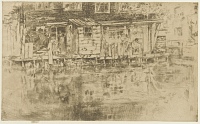The Long House (The Dyers, Amsterdam) | ||
| Number: | 453 | |
| Date: | 1889 | |
| Medium: | etching and drypoint | |
| Size: | 166 x 271 mm | |
| Signed: | butterfly to upper left of centre | |
| Inscribed: | no | |
| Set/Publication: | no | |
| No. of States: | 6 | |
| Known impressions: | 14 | |
| Catalogues: | K.406; M.408; W.266 | |
| Impressions taken from this plate (14) | ||
TECHNIQUE
This is mainly etching, with some areas deeply etched and others with extremely lightly etched shading, providing a variety of dots, dashes, lines and textures. There may also be a few areas where drypoint was used to back up the etched line.
PRINTING
One impression is marked '1st Proof pulled' and was printed in dark brown ink on cream laid watermarked paper ( ), followed by one marked '1st state', which is in brown ink on 'antique' (pre-1800) laid paper (
), followed by one marked '1st state', which is in brown ink on 'antique' (pre-1800) laid paper ( ), and another, later, state on ivory laid paper (
), and another, later, state on ivory laid paper ( ).
).
Following these proofs, the main print-run appears to have taken place in March 1890.
 ), followed by one marked '1st state', which is in brown ink on 'antique' (pre-1800) laid paper (
), followed by one marked '1st state', which is in brown ink on 'antique' (pre-1800) laid paper ( ), and another, later, state on ivory laid paper (
), and another, later, state on ivory laid paper ( ).
). Following these proofs, the main print-run appears to have taken place in March 1890.
At least six impressions of Dutch etchings were printed on 6 March 1890, dated and numbered as follows:
The duplication of the first number may mean that Whistler was creating two sets, for individual clients. Other numbers may have been lost, removed, or not noticed (they are written in very small script) so the record is not necessarily complete.
The first (Balcony, Amsterdam) and second (Long House - Dyer’s - Amsterdam) impressions printed on 6 March 1890 were in dark brown ink on light-weight cream Asian paper ( ,
,  ), the fifth on very thin dark ivory laid paper (
), the fifth on very thin dark ivory laid paper ( ). A variety of papers were employed at other times for printing this, the final state, including ivory laid paper with 'DHK' countermark (
). A variety of papers were employed at other times for printing this, the final state, including ivory laid paper with 'DHK' countermark ( ) and Asian papers including light tan Japan (
) and Asian papers including light tan Japan ( ), cream (
), cream ( ,
,  ) and Asian laid paper (
) and Asian laid paper ( ,
,  ).
).
 ,
,  ), the fifth on very thin dark ivory laid paper (
), the fifth on very thin dark ivory laid paper ( ). A variety of papers were employed at other times for printing this, the final state, including ivory laid paper with 'DHK' countermark (
). A variety of papers were employed at other times for printing this, the final state, including ivory laid paper with 'DHK' countermark ( ) and Asian papers including light tan Japan (
) and Asian papers including light tan Japan ( ), cream (
), cream ( ,
,  ) and Asian laid paper (
) and Asian laid paper ( ,
,  ).
).
